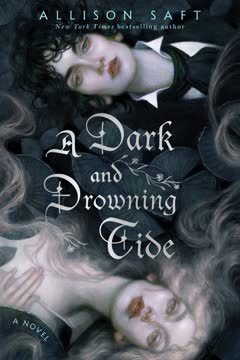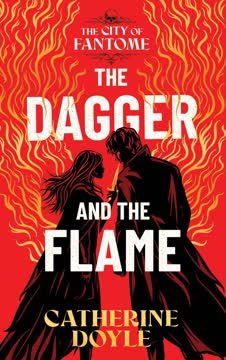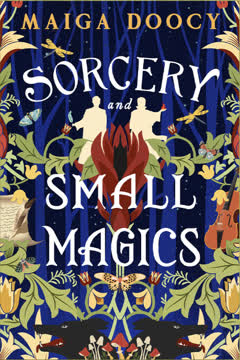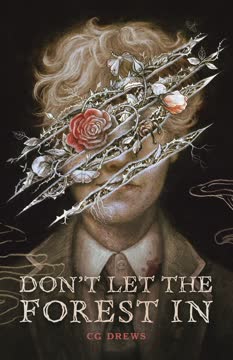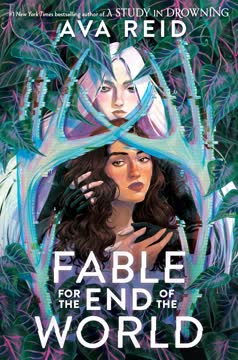Plot Summary
Riverbank Rivalry Ignites
Lorelei Kaskel, a sharp-tongued Yevanisch folklorist, and Sylvia von Wolff, a charismatic Albisch naturalist, are introduced as academic rivals at Ruhigburg University. Their animosity is on full display when Sylvia attempts to tame a dangerous nixie at the riverbank, drawing a crowd and Lorelei's scorn. Both are vying for the coveted co-leader position on the king's grand expedition to find the Ursprung, the fabled source of all magic. The scene establishes their complex relationship—part envy, part fascination, and part unspoken longing—while also hinting at the social and political tensions simmering beneath the surface: Lorelei's outsider status as a Yeva, Sylvia's noble lineage, and the kingdom's fragile unity.
The King's Deadly Dream
King Wilhelm, eager to cement his rule over the newly unified Brunnestaad, commissions an expedition to find the Ursprung, believing its power will secure his reign. The expedition's crew—known as the Ruhigburg Five—are introduced at a lavish send-off ball, each with their own ambitions and rivalries. Lorelei is unexpectedly named co-leader, shocking both her and Sylvia. The king's dream is revealed to be as much about political control as it is about magic, and the expedition is cast as a high-stakes gamble with the fate of the kingdom—and the personal futures of its members—hanging in the balance.
Shadows of the Yevanverte
Lorelei's background as a Yevanisch outsider is explored, revealing the deep scars of anti-Yeva prejudice and personal trauma. Her family's love is a source of both comfort and guilt, and her ambition is driven by a desperate need for safety and belonging. The narrative weaves in the kingdom's folktales, which both reflect and reinforce the social order, casting Lorelei as the perennial "Yeva in thorns"—a survivor who has learned to wield her own venom as protection. The chapter sets the emotional stakes for Lorelei: her dreams of freedom, her complicated relationship with her mentor Ziegler, and her fraught connection to Sylvia.
The Expedition Sets Sail
The crew embarks on the riverboat Prinzessin, carrying with them scientific equipment, personal baggage, and simmering resentments. Lorelei navigates the social minefield of the expedition, forming a wary friendship with Ludwig, the botanist, and clashing with Johann, the medic and noble zealot. The group's dynamics are shaped by old wounds, unspoken desires, and the ever-present threat of betrayal. Magic is both a tool and a source of suspicion, especially as Lorelei's own abilities—long hidden—begin to surface. The journey is marked by omens, both supernatural and psychological, foreshadowing the darkness to come.
A Murder in the Night
The expedition is thrown into chaos when Professor Ziegler is found dead, apparently drowned and stabbed in the war room. Lorelei, who discovers the body, is immediately a suspect, but she and Sylvia form a secret pact to protect each other. The murder exposes the group's fractures and forces Lorelei into a reluctant leadership role. King Wilhelm's response is cold and pragmatic: the expedition must continue, and someone must be held accountable. The murder mystery becomes entwined with the quest for the Ursprung, as trust erodes and every member becomes both suspect and potential victim.
Suspicions and Alliances
Lorelei begins a covert investigation, interviewing her companions and uncovering motives, secrets, and old grievances. Ludwig's charm masks his own ambitions; Adelheid, the stoic thaumatologist, is fiercely loyal to her war-torn province; Heike, the beautiful astronomer, is driven by desperation and thwarted love; Johann's fanaticism hides a capacity for violence. The group is haunted by both literal and figurative ghosts—trauma, guilt, and the weight of history. Lorelei's relationship with Sylvia grows more complicated, shifting from rivalry to uneasy partnership, and then to something deeper, as they are forced to rely on each other for survival.
Into the Enchanted Wilds
The expedition leaves the riverboat and ventures into the wilds of Albe, following the trail of folktales and magical anomalies. The landscape is alive with enchantment: shifting forests, dangerous wildeleute, and environmental hazards that test both their scientific skills and their ability to trust one another. The group is repeatedly waylaid by magical creatures—lindworms, alps, nixies—each encounter revealing more about the nature of magic and the limits of reason. The journey becomes a crucible, burning away illusions and forcing each character to confront their own darkness.
The Lindworm's Lair
A deadly encounter with a lindworm leaves the group battered and divided. Lorelei's use of magic to save Sylvia exposes her secret to the others, deepening suspicion and fear. The group's equipment and resources are lost, forcing them to rely on local knowledge and the kindness—or hostility—of villagers. The festival in the mountain village becomes a microcosm of the kingdom's tensions, with Sylvia celebrated as a folk hero and Lorelei reminded of her outsider status. The legend of the Ursprung is retold, casting new light on the quest and the personal stakes for each member.
Village of Saints and Sinners
The group's stay in the village is marked by both celebration and danger. Sylvia's role as the "Moonlight Princess" is both a blessing and a curse, as local politics and old resentments come to the fore. Lorelei's investigation uncovers more about Heike's motives and the tangled web of alliances and betrayals that bind the group. The festival's effigy-burning is a chilling reminder of the power of stories to both unite and divide. The group's unity is further tested as they prepare to ascend the mountain in search of the Ursprung.
Tangled Loyalties Revealed
The mountain ascent becomes a literal and metaphorical maze, with the group trapped by magical enchantments and forced to confront their own loyalties. Ludwig's disappearance and near-death at the hands of a curse reveal the lengths to which someone will go to sabotage the expedition. Lorelei's investigation points to Heike as the likely saboteur, but the truth remains elusive. The group's bonds are frayed to the breaking point, and Lorelei is forced to choose between survival and justice.
The Mountain's Endless Maze
As the group wanders in circles, Lorelei and Sylvia are forced into an uneasy alliance, sharing personal histories and vulnerabilities. The maze becomes a crucible for confession and forgiveness, as old wounds are aired and new bonds are forged. Ludwig's rescue and the discovery of a hidden journal page point to a deeper conspiracy. The group's survival depends on their ability to trust each other, but betrayal lurks in every shadow.
Betrayal in the Blood
Back on the riverboat, Lorelei uncovers Ziegler's hidden journal, revealing a conspiracy between Ziegler and Anja von Wolff to falsify the expedition's findings for political gain. Adelheid is unmasked as Ziegler's murderer, driven by desperation to protect her war-ravaged province and a willingness to sacrifice anyone—including her friends—for the greater good. Lorelei is forced into a devil's bargain: betray Sylvia to save herself and her people, or risk everything for love and justice. The group's unity is shattered, and the final leg of the quest looms.
The Vanishing Isle Appears
The expedition reaches the Vanishing Isle, a magical, shifting island that appears only at the new moon. The island is alive with magic and danger, and the group must navigate both supernatural threats and their own fractured loyalties. The Ursprung is finally found, but its power comes at a terrible price: only the worthy may claim it, and those who try to seize it by force are destroyed. Adelheid's attempt to take the Ursprung's power ends in tragedy, and the group is left to reckon with the cost of ambition and betrayal.
The Ursprung's True Face
Sylvia, revealed as the true heir to the Ursprung's power, must decide whether to use it to secure the kingdom or to destroy it. Sylvia and Lorelei's relationship, tested by betrayal and loss, becomes the emotional heart of the story. The surviving members of the expedition must choose between vengeance and mercy, between the old order and the possibility of something new. The Ursprung's magic is both a blessing and a curse, and its true nature is revealed to be as much about connection and forgiveness as about raw power.
The Price of Power
The survivors return to Ruhigburg, where King Wilhelm must decide the fate of the kingdom—and of those who have returned. Anja von Wolff is exiled, Sylvia assumes her mother's title, and Lorelei is granted the status and freedom she has long sought. The cost of victory is high: friends lost, innocence shattered, and the future uncertain. But there is hope, too, in the possibility of new beginnings and the power of love to heal even the deepest wounds.
The Final Confrontation
In the throne room, the survivors face Wilhelm and the consequences of their actions. Sylvia refuses the king's hand in marriage, instead pledging her loyalty and the power of the Ursprung to the kingdom on her own terms. Lorelei is offered a place at court, her outsider status finally acknowledged and respected. The old order is broken, and a new, more just one begins to take shape—one built on hard-won trust, forgiveness, and the lessons of the past.
Aftermath and Reckoning
In the aftermath, Lorelei and Sylvia are separated by duty and distance, but their love endures. The kingdom is changed, but not healed; the scars of war and betrayal linger, but so does the hope of something better. Lorelei, now a trusted adviser, finds herself haunted less by ghosts and more by longing. When Sylvia returns, their reunion is both a personal and political act of defiance—a promise that, together, they can write a new story for themselves and for Brunnestaad.
Characters
Lorelei Kaskel
Lorelei is a Yevanisch folklorist whose sharp intellect and sharper tongue have earned her both respect and suspicion. Marked by trauma and prejudice, she has learned to wield her own venom as protection, embracing the role of the "viper" to survive in a world that would rather see her erased. Her ambition is driven by a desperate need for safety, belonging, and the freedom to live as herself. Lorelei's relationship with Sylvia is the emotional core of the novel, evolving from rivalry to partnership to love. Her journey is one of self-forgiveness, learning to trust, and ultimately choosing hope over fear—even when it means risking everything.
Sylvia von Wolff
Sylvia is the brilliant, beloved naturalist and heir to the rebellious province of Albe. Her easy charm and warmth mask deep wounds: a fraught relationship with her mother, the trauma of war, and the burden of being both a symbol and a pawn. Sylvia's methodology—embracing wonder, seeking connection with the magical world—sets her apart, but also makes her vulnerable. Her rivalry with Lorelei is fueled by both envy and longing, and her journey is one of claiming her own power, forgiving herself, and choosing love and justice over duty and expectation.
Ingrid Ziegler
Ziegler is the expedition's leader, Lorelei's mentor, and a legendary naturalist whose ideals have shaped a generation. Her death is the inciting incident that shatters the group and exposes the rot at the heart of the kingdom. Ziegler's own compromises and betrayals are revealed posthumously, forcing Lorelei to confront the complexity of those she admires. Ziegler embodies both the promise and the peril of ambition, and her legacy is one of both inspiration and warning.
King Wilhelm II
Wilhelm is the young king whose quest for the Ursprung is as much about securing his own power as it is about unifying the kingdom. Charismatic but ruthless, he is both a patron and a threat to the expedition. Wilhelm's willingness to sacrifice others for the sake of unity—and his cold pragmatism in the face of tragedy—make him both a product and a perpetuator of the kingdom's violence. His relationship with the survivors is transactional, but he is ultimately forced to reckon with the limits of power and the need for trust.
Adelheid de Mohl
Adelheid is the expedition's thaumatologist, a woman forged by the hardships of war and the devastation of her homeland, Ebul. Her loyalty to her people drives her to murder Ziegler and attempt to seize the Ursprung's power for herself. Adelheid is both a victim and a perpetrator, her actions shaped by desperation and a willingness to sacrifice anything for the greater good. Her relationship with Johann is both protective and destructive, and her ultimate downfall is a warning about the cost of unchecked ambition.
Heike van der Kaas
Heike is the expedition's astronomer and the cosseted heiress of Sorvig. Driven by a need to escape her mother's control and secure her own future, Heike is both a victim and a schemer. Her rivalry with Sylvia is rooted in old wounds and unrequited love, and her willingness to sabotage the expedition is born of desperation. Heike's journey is one of self-preservation, but also of learning to trust and forgive.
Johann zu Wittelsbach
Johann is the expedition's medic and a nobleman from Herzin, shaped by war and a rigid sense of duty. His fanaticism and capacity for violence make him both a threat and a protector, especially to Adelheid. Johann's actions are driven by loyalty, but also by a deep-seated need for purpose and control. His ultimate fate is a cautionary tale about the dangers of blind allegiance and the cost of dehumanizing others.
Ludwig von Meyer
Ludwig is the botanist, a commoner elevated by wealth and talent. His charm and affability mask his own ambitions and insecurities, and his survival is as much a product of luck as of skill. Ludwig's relationships with the others are marked by both genuine affection and a willingness to play the game. His transformation—both magical and personal—reflects the novel's themes of adaptation and the price of survival.
Anja von Wolff
Anja is Sylvia's mother and the architect of a conspiracy to use the expedition for Albe's political gain. Her willingness to sacrifice anyone—including her own daughter—for power makes her both a formidable antagonist and a tragic figure. Anja's actions force Sylvia to confront the legacy of her family and to choose her own path.
Aaron Kaskel (Lorelei's brother)
Aaron's murder in Lorelei's childhood is the defining trauma of her life, shaping her fears, ambitions, and sense of justice. His presence as a ghost—both literal and psychological—haunts Lorelei throughout the novel, representing the weight of the past and the challenge of forgiveness.
Plot Devices
Murder Mystery as Catalyst
The murder of Ziegler is the central plot device that transforms the expedition from a quest into a crucible. It forces the characters to confront their own motives, secrets, and loyalties, and it provides the narrative engine for both the external journey and the internal transformations. The mystery is layered with red herrings, shifting suspicions, and the gradual unmasking of the true killer, all while deepening the psychological complexity of the cast.
Folklore and Fairy Tales
The novel is structured around the folktales and legends of Brunnestaad, which both reflect and shape the characters' actions and the kingdom's history. These stories are used as foreshadowing, allegory, and commentary, blurring the line between myth and reality. The Ursprung itself is both a literal and symbolic source, and the characters' fates are entwined with the stories they tell and believe.
Dual Protagonists and Enemies-to-Lovers
The narrative is driven by the evolving relationship between Lorelei and Sylvia, whose rivalry is rooted in both personal and political tensions. Their journey from enemies to lovers is marked by sharp banter, mutual rescue, betrayal, and ultimately, forgiveness. Their dynamic is the emotional heart of the novel, providing both tension and catharsis.
Magic as Metaphor and Threat
Magic in the novel is both a tool and a test, revealing the true nature of those who wield it. The Ursprung's power is both seductive and destructive, and the ability to channel aether is tied to identity, belonging, and worthiness. The dangers of magic—both personal and political—mirror the dangers of ambition, prejudice, and unchecked power.
Rotating Suspicions and Shifting Alliances
The plot is structured around shifting alliances, betrayals, and the constant threat of violence. Every character is both suspect and potential victim, and the narrative uses misdirection, confession, and reversal to keep the reader—and the characters—off-balance. The resolution is earned through both deduction and emotional reckoning.
Analysis
A Dark and Drowning Tide is a lush, psychologically rich fantasy that uses the framework of a murder mystery and a magical quest to explore themes of power, prejudice, trauma, and forgiveness. At its heart, the novel is about the stories we tell—about ourselves, our enemies, and our hopes for the future—and how those stories can both imprison and liberate us. Lorelei and Sylvia's journey from rivals to lovers is a testament to the possibility of healing and connection in a world scarred by violence and betrayal. The novel interrogates the costs of survival, the dangers of unchecked ambition, and the necessity of both justice and mercy. In the end, it suggests that true power lies not in domination or purity, but in the messy, painful work of trust, love, and rewriting the stories that have defined us.
Last updated:
FAQ
Synopsis & Basic Details
What is A Dark and Drowning Tide about?
- A perilous quest for magic: A Dark and Drowning Tide follows Lorelei Kaskel, a sharp-tongued Yevanisch folklorist, and Sylvia von Wolff, a charismatic Albisch naturalist, as they embark on a royal expedition to find the Ursprung, the fabled source of all magic in the kingdom of Brunnestaad. This quest, commissioned by King Wilhelm II, is meant to unify his fractured realm but quickly devolves into a desperate struggle for survival.
- Murder and shifting loyalties: The expedition is thrown into chaos by the murder of their mentor, Professor Ingrid Ziegler. Lorelei, unexpectedly named co-leader, finds herself entangled in a murder mystery, forced to navigate a web of secrets, betrayals, and shifting alliances among her fellow crew members, each with their own hidden agendas and desperate ambitions.
- A journey of self-discovery: As Lorelei and Sylvia's intense rivalry evolves into an undeniable connection, they must confront not only external dangers from magical creatures and political intrigue but also their own past traumas, societal prejudices, and the true meaning of power, love, and belonging in a world that seeks to define them.
Why should I read A Dark and Drowning Tide?
- Deep psychological exploration: Readers should delve into A Dark and Drowning Tide for its intricate psychological analysis of characters grappling with trauma, prejudice, and the moral compromises of survival. The novel masterfully portrays Lorelei's internal conflict, her journey from self-loathing to self-acceptance, and the complex motivations driving each member of the expedition.
- Rich, atmospheric world-building: Allison Saft crafts a Brunnestaad steeped in evocative folklore and a palpable sense of magic, where ancient tales literally come to life. The shifting landscapes, from the dark Vereist river to the enchanted Albisch mountains and the mysterious Vanishing Isle, create a vivid backdrop that is both beautiful and terrifying, enhancing the story's themes of nature and power.
- Compelling enemies-to-lovers romance: At its heart, the book offers a deeply satisfying and emotionally resonant enemies-to-lovers narrative between Lorelei and Sylvia. Their sharp banter, intellectual sparring, and gradual vulnerability build a powerful connection that challenges societal norms and provides a beacon of hope amidst political turmoil and personal despair, making it a standout queer fantasy romance.
What is the background of A Dark and Drowning Tide?
- A fractured, newly unified kingdom: The story is set in Brunnestaad, a kingdom recently unified by King Wilhelm II, whose father initiated a ruthless military campaign. This unification has left deep scars, with provinces like Albe (Sylvia's homeland) and Ebul (Adelheid's homeland) still harboring resentment and a desire for independence, creating a volatile political landscape.
- Magic as a natural, yet feared, force: Magic, or "aether," is a natural substance found primarily in water, wielded by most Brunnestaaders. However, its use by Yevani (Lorelei's people) is viewed with suspicion and fear, leading to systemic prejudice and violence. This societal context directly impacts Lorelei's hidden abilities and her struggle for acceptance.
- Folklore as cultural bedrock: The kingdom's diverse provinces each possess unique folktales and legends, particularly surrounding the Ursprung. These stories are not mere myths but active forces that shape beliefs, justify actions, and even influence the physical world, blurring the lines between history, myth, and present-day reality.
What are the most memorable quotes in A Dark and Drowning Tide?
- "You're like a spaniel that's still surprised when it's kicked.": Heike's cutting remark to Lorelei in Chapter Two perfectly encapsulates Lorelei's internal struggle with her outsider status and the constant prejudice she faces, highlighting her resilience despite the pain. It reveals the casual cruelty of the nobility and Lorelei's enduring vulnerability beneath her hardened exterior.
- "Unity requires sacrifice.": King Wilhelm's chilling pronouncement in Chapter Six, delivered in his letter to Lorelei, defines his ruthless pragmatism and the high stakes of the expedition. This quote underscores the novel's central theme of political expediency versus moral integrity, foreshadowing the difficult choices Lorelei must make to protect herself and her people.
- "You've acted the part of a villain so well, you've gone and convinced yourself it's who you truly are.": Sylvia's poignant observation to Lorelei in Chapter Twenty-Four cuts to the core of Lorelei's character arc. It highlights the psychological toll of Lorelei's self-protective persona and the novel's exploration of identity, self-perception, and the possibility of redemption through love and forgiveness.
What writing style, narrative choices, and literary techniques does Allison Saft use?
- Lush, gothic prose with sharp dialogue: Saft employs a rich, evocative prose style that imbues the world with a gothic atmosphere, using vivid imagery and sensory details to create a palpable sense of place and mood. This is contrasted with sharp, often biting, dialogue that reveals character dynamics and underlying tensions, particularly in the exchanges between Lorelei and Sylvia.
- First-person limited perspective with internal monologue: The narrative is primarily told from Lorelei's first-person perspective, offering deep insight into her complex internal world, her anxieties, and her often-unreliable interpretations of events and people. This choice allows for a profound exploration of Lorelei's psychological complexities and her journey of self-discovery, making her a deeply empathetic, if prickly, protagonist.
- Symbolism and thematic echoes: The novel is rich in symbolism, from the recurring motif of thorns and vipers reflecting Lorelei's self-perception to the contrasting imagery of light and darkness representing hope and despair. Saft masterfully weaves in thematic echoes of folklore, using traditional fairy tale structures to comment on power dynamics, societal roles, and the subversion of expectations.
Hidden Details & Subtle Connections
What are some minor details that add significant meaning?
- Ziegler's "gilded chain": Professor Ziegler's resentment of her role as Wilhelm's chamberlain, describing herself as being on a "gilded chain" (Chapter Two), subtly foreshadows her eventual betrayal. This seemingly throwaway line reveals her deep-seated desire for freedom and autonomy, mirroring Lorelei's own aspirations and setting the stage for Ziegler's desperate alliance with Anja von Wolff. It highlights the theme of personal liberty versus political constraint.
- Ludwig's "artfully tousled" hair: Ludwig's description as having "artfully tousled" hair (Chapter Three) and his general aesthetic pretension, despite his commoner birth, hints at his deep-seated insecurity and desire to fit in with the nobility. This detail subtly explains his later willingness to accept Wilhelm's bribe of land, revealing his ambition to solidify his status and escape his "upstart" origins, connecting to themes of class and social mobility.
- The elwedritsche's disappearance: The elwedritsche, Ziegler's "favorite pet" (Chapter Four), is noted as missing from its perch after her murder. This seemingly minor detail, dismissed by Lorelei as "disloyal," subtly suggests the killer's meticulousness in removing potential witnesses or magical wards, or perhaps even a symbolic rejection of Ziegler's presence, adding a layer to the murder mystery analysis.
What are some subtle foreshadowing and callbacks?
- Lorelei's broken watch: After falling into the Vereist with Sylvia, Lorelei's watch is "fixed eternally at five minutes past their scheduled departure time" (Chapter One). This subtly foreshadows the expedition's deviation from its planned course and the disruption of established order, hinting that time itself will become distorted or irrelevant in their quest for the Ursprung. It's a callback to the initial chaos Sylvia brings to Lorelei's meticulously planned life.
- The "Yeva in thorns" folktale: The story Lorelei recounts in Chapter Three, where a Yeva is ensnared in thorns and then hanged as a thief, is a powerful piece of foreshadowing for Lorelei's own journey. It directly mirrors her self-perception, her fear of being trapped and scapegoated, and ultimately, her decision to betray Sylvia to protect her people, fulfilling the "thief" archetype in a complex way. This deepens the themes of prejudice and self-fulfilling prophecy.
- Sylvia's "Mondscheinprinzessin" nickname: The Albisch villagers' affectionate but politically charged nickname for Sylvia, "Mondscheinprinzessin" (Moonlight Princess) in Chapter Nine, foreshadows her eventual role as the chosen wielder of the Ursprung's power. The moon, often associated with hidden magic and feminine power, links directly to the Ursprung's appearance on the new moon and Sylvia's inherent connection to the magical world, highlighting her destiny beyond mere nobility.
What are some unexpected character connections?
- Adelheid's protective bond with Johann: While Adelheid and Johann appear as a stoic, inseparable pair, Adelheid's confession that she "used to despise him" (Chapter Seven) and her later revelation that he swore an oath to her dead brother, Alexander, reveals a deeper, more complex bond. This connection, rooted in shared trauma and a sense of duty, explains Adelheid's willingness to protect Johann even when he acts monstrously, and his unwavering loyalty to her, complicating the initial perception of their relationship.
- Ludwig's hidden ambition and connection to Sylvia: Ludwig, initially presented as a charming, gossipy botanist, reveals a surprising depth of ambition, having been bribed by Wilhelm with land (Chapter Twelve). His past expeditions with Sylvia, where he was "infected... with her recklessness," show a shared history that goes beyond casual friendship, hinting at a mutual influence that shaped their respective paths and subtly explaining his later concern for her well-being.
- Ziegler's financial struggles and Anja von Wolff's influence: The revelation that Ziegler was deeply in debt from her publications and that Anja von Wolff funded her research (Chapter Nineteen) creates an unexpected connection between the expedition's leader and Sylvia's mother. This financial leverage explains Ziegler's willingness to collude in falsifying the Ursprung's location, transforming her from a purely idealistic mentor into a pragmatic, compromised figure driven by personal survival, which is a crucial plot twist in the murder mystery.
Who are the most significant supporting characters?
- Adelheid de Mohl, the tragic antagonist: Adelheid is pivotal as Ziegler's murderer and the architect of a coup against Wilhelm. Her unwavering loyalty to Ebul, born from its war-torn history, drives her to extreme measures, making her a complex figure whose actions, though violent, stem from a deep desire to protect her people. Her character highlights the devastating impact of war and political instability on individuals and provinces.
- Johann zu Wittelsbach, the conflicted zealot: Johann serves as a constant antagonist to Lorelei, embodying the kingdom's prejudice and rigid social order. However, his fierce loyalty to Adelheid and his internal struggle with his own violent nature reveal a more nuanced character. His ultimate sacrifice for Adelheid underscores the theme of love and loyalty overriding even deeply ingrained beliefs, making him a tragic figure caught between duty and affection.
- Ludwig von Meyer, the adaptable survivor: Ludwig, the botanist, acts as a crucial bridge between the main characters and the wider political landscape. His charming demeanor and adaptability allow him to navigate the treacherous social dynamics of the expedition, while his quiet ambition and magical transformation (the eschenfrau curse) symbolize the novel's themes of survival, change, and the unexpected costs of power. He provides moments of levity and unexpected insight, often serving as a confidante.
Psychological, Emotional, & Relational Analysis
What are some unspoken motivations of the characters?
- Lorelei's desperate need for belonging: Beyond her stated ambition for a shutzyeva title and freedom, Lorelei's deepest unspoken motivation is a profound yearning for acceptance and a place where she isn't defined by her Yevanisch heritage or past trauma. Her relentless pursuit of academic success and her guarded demeanor are defenses against the fear of rejection and abandonment, stemming from Aaron's death and societal prejudice. This is evident in her internal monologues about being "the Yeva in thorns" (Chapter Three).
- Sylvia's quest for genuine recognition: While Sylvia appears confident and beloved, her unspoken motivation is to be seen and valued for her true self, not just as the "Mondscheinprinzessin" or a political pawn. Her "overexuberant" personality and eagerness to connect with wildeleute are partly a defense mechanism against her mother's emotional distance and the burden of her noble lineage, as revealed in her confession about Anja only seeing "the color of my hair" (Chapter Fifteen).
- Heike's yearning for agency and escape: Heike's manipulative behavior and ambition are driven by an unspoken desperation to escape her mother's control and a predetermined, undesirable marriage. Her desire for the Ursprung to be in Sorvig, and her subsequent attempts to sabotage the expedition, stem from a deep-seated need for personal agency and a future of her own choosing, rather than pure malice. This is subtly revealed in her conversation with Lorelei about the "Prince of Black Doves" (Chapter Twelve).
What psychological complexities do the characters exhibit?
- Lorelei's self-fulfilling prophecy of villainy: Lorelei exhibits a complex psychological pattern of embracing the "viper" persona others project onto her, believing herself inherently cruel and undeserving of happiness. This self-perception, born from trauma and prejudice, leads her to push away those who care for her, creating a self-fulfilling prophecy of isolation. Her internal struggle is a core psychological complexity, as seen when she thinks, "If she should go down, she would go down hissing like one" (Chapter Three).
- Sylvia's romanticized view of the world vs. harsh reality: Sylvia's idealism and "sense of wonder" (Chapter Eleven) are a psychological coping mechanism against the brutal realities of war and political manipulation she has experienced. Her tendency to romanticize situations and believe in the inherent good of people, even those who betray her, showcases a complex interplay between hope and denial, which is both her strength and her vulnerability.
- Johann's struggle with inherent violence and imposed purpose: Johann's character is psychologically complex due to his internal conflict between his ingrained capacity for violence, honed by war and his Herzisch upbringing, and his desire for a "pure" Brunnestaad. His loyalty to Adelheid, who "asked me to set it down" (Chapter Ten), reveals a yearning for restraint and a struggle against the "purpose" of bloodshed he was given as a child, making him a tragic figure.
What are the major emotional turning points?
- Lorelei's realization of Ziegler's betrayal: The discovery of Ziegler's hidden journal and her collusion with Anja von Wolff (Chapter Eighteen) is a major emotional turning point for Lorelei. It shatters her idealized image of her mentor, forcing her to confront the painful truth that even those she loved and admired were capable of profound selfishness and betrayal, leading to a deep sense of disillusionment and renewed cynicism.
- Sylvia's public pledge of loyalty to Wilhelm: Sylvia's speech at the Feast Day of Saint Bruno (Chapter Ten), where she publicly pledges loyalty to King Wilhelm despite her personal misgivings and her mother's machinations, is a significant emotional turning point. It marks her decision to prioritize the stability of Brunnestaad and the well-being of her people over personal ambition or familial loyalty, showcasing her growth and commitment to a greater good.
- Lorelei's confession of love and vulnerability: Lorelei's raw, vulnerable confession of her feelings for Sylvia in the Ursprung cavern (Chapter Twenty-Five) is a pivotal emotional turning point. It represents her breaking down the walls she's built around herself, acknowledging her deepest desires, and choosing to risk emotional intimacy despite her fears of abandonment and unworthiness, leading to a profound shift in her character and relationship with Sylvia.
How do relationship dynamics evolve?
- Lorelei and Sylvia: From bitter rivals to interdependent lovers: Their dynamic evolves from intense academic and personal rivalry, fueled by Lorelei's envy and Sylvia's perceived arrogance, into a deep, interdependent love. Initial clashes give way to reluctant alliances, shared vulnerabilities, and mutual protection, culminating in Lorelei's confession and their commitment to a future together, despite societal obstacles. This is the core enemies-to-lovers arc.
- Adelheid and Johann: From duty-bound allies to tragic co-conspirators: Their relationship, initially presented as a stoic partnership forged in war and duty, deepens into a tragic co-conspiracy. Johann's unwavering, almost obsessive, loyalty to Adelheid, stemming from an oath to her dead brother, leads him to participate in her murderous plot. Their bond highlights the destructive power of blind allegiance and the tragic consequences of prioritizing a singular loyalty over broader morality.
- The Ruhigburg Five: From childhood friends to fractured survivors: The initial camaraderie of the "Ruhigburg Five" (Wilhelm, Sylvia, Adelheid, Johann, Heike, Ludwig) is systematically dismantled by the expedition's pressures, betrayals, and deaths. Their childhood promise "never to turn on each other" (Chapter Sixteen) is broken, revealing the fragility of bonds under extreme duress and the corrupting influence of power and ambition. The survivors form new, tentative alliances based on shared trauma and a desperate need for mutual protection.
Interpretation & Debate
Which parts of the story remain ambiguous or open-ended?
- The full extent of the Ursprung's power: While Sylvia wields the Ursprung's power, its ultimate limits and long-term effects remain somewhat ambiguous. The narrative hints at its potential for both creation and destruction, and the price it exacts on its wielder is not fully explored, leaving readers to ponder the true cost of such immense magic and Sylvia's future challenges in controlling it. This contributes to the themes of power and responsibility.
- The future stability of Brunnestaad: Despite Wilhelm's efforts and Sylvia's commitment, the long-term political stability of Brunnestaad remains open-ended. The deep-seated provincial resentments, the lingering threat of war, and the inherent ruthlessness of Wilhelm's rule suggest that the "unified kingdom" is still a fragile construct. The ending offers hope but acknowledges the ongoing struggle for true peace and justice, inviting debate on the efficacy of their actions.
- The nature of Lorelei's "ghosts": The literal and psychological presence of Lorelei's "ghosts" – Aaron and Ziegler – remains somewhat ambiguous. While they represent her trauma and guilt, their occasional physical manifestations and Lorelei's ability to interact with them raise questions about the boundaries of reality and the supernatural. The narrative leaves it open whether they are purely psychological projections or actual spectral entities, deepening the exploration of Lorelei's mental state and the pervasive magic of the world.
What are some debatable, controversial scenes or moments in A Dark and Drowning Tide?
- **Lorelei's decision to frame [Sylvia
Review Summary
A Dark and Drowning Tide received mixed reviews. Many praised the atmospheric writing, sapphic romance, and Jewish representation. Readers enjoyed the folklore elements and academic rivals-to-lovers trope. However, some found the pacing slow, worldbuilding confusing, and political themes underdeveloped. The murder mystery aspect disappointed some, while others appreciated the character development. Critics noted issues with the handling of colonialism and antisemitism. Despite these concerns, many readers found the book engaging and beautifully written, particularly enjoying the relationship between Lorelei and Sylvia.
Similar Books
Download PDF
Download EPUB
.epub digital book format is ideal for reading ebooks on phones, tablets, and e-readers.
